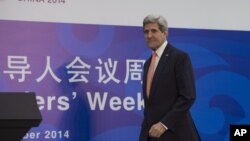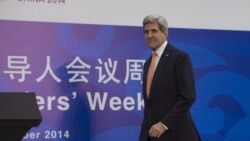“The United States is very committed to working with our APEC partners in order to build a stable regional economic order based on rules and norms that are reinforced by institutions,” U.S. Secretary of State John Kerry said recently to the international press in Beijing, China. “To ensure that the[se] partnerships . . . are able to endure, it is really essential that we reach agreement on the rules of the road.”
APEC is essential to upholding the rules-based system throughout the Asia Pacific and enabling that all member economies, big and small, have a voice.
“I am very pleased with the progress that we made this year on the regional economic integration and on strengthening connectivity and infrastructure development,” Secretary Kerry said. “Our goal is to remove barriers to trade and investment so that businesses in all APEC economies can grow and create jobs and compete with other companies and other countries on an equal basis.”
Important progress has been made with all the APEC economies on promoting women’s economic empowerment, combating corruption, supporting educational opportunities across borders, and advancing APEC’s commitment to clean energy.
“These efforts complement and reinforce one another,” Secretary Kerry continued. “Curtailing corruption makes our marketplace more efficient and fair. Cutting fossil fuel subsidies creates a cleaner environment and a stronger economy. Enhanced opportunities for women affect and advance the cause of social justice and prosperity.”
All the achieved progress supports a single, important goal: securing an equitable and sustainable future for the APEC economies.
“We all understand that Ebola is a global threat requiring global action” Secretary Kerry said. “Many countries have been coming together in an effort to try to create a greater response on Ebola… [and] I urged all of our APEC partners to help…We hope the response will grow, and obviously, out of that can come an enormous example of the ability of countries to come together. What we do against Ebola can actually be a model for what we can do against any other future challenge of a similar kind.”






